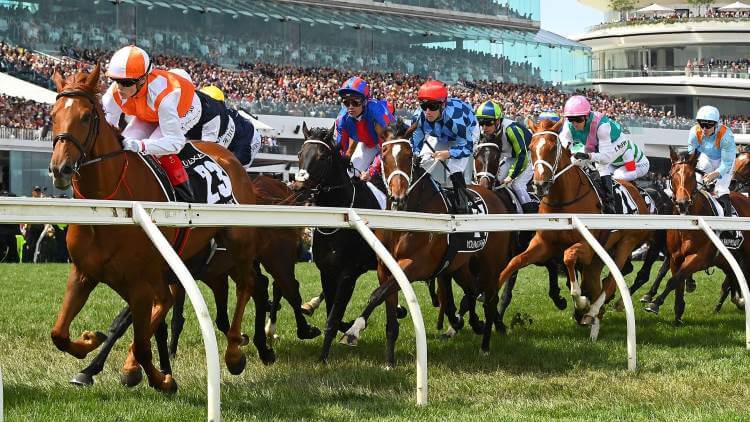Horse Racing Class Guide
Understanding horse racing classes is crucial for bettors. This is because they provide insights into the level of competition and the quality of horses participating in races. This knowledge enables fans of Australian horse racing to make better decisions and develop successful online betting strategies. This article aims to educate bettors on the significance of horse racing classes and how they impact betting outcomes.
| Rank | Site | Bonus | Bet | |||
|---|---|---|---|---|---|---|
| 1 |  | Ladbrokes | | 5/5 | 100% Match up to $250 | Bet now Review |
| 2 |  | Picklebet | | 4.9/5 | Login to see promotions | Bet now Review |
| 3 |  | Palmerbet | | 4.8/5 | 100% Match | Bet now Review |
What are Horse Racing Classes?
Horse racing class categorise races based on horse quality and experience, which is essential in Australian horse racing. These classes ensure fair competition by grouping horses with similar capabilities. Horse racing authorities like NSW Racing establish and regulate these classes, maintaining consistency and integrity in the sport.
Horse racing class differentiate races based on the calibre of horses involved. These range from elite Group 1 events to lower-tier maiden races. Understanding these classifications is vital for effective horse racing betting strategies. Bettors can assess the level of competition and the quality of horses, and this helps in making informed decisions.
In Group 1 races, top-tier horses compete, while maiden races feature inexperienced horses. Betting strategies vary depending on the class, with different factors influencing outcomes:
Horse Quality
The calibre of horses participating in a race significantly impacts its outcome. Higher-quality horses typically perform better in elite races, like Group 1 races. Lower-quality horses may struggle to compete because of their horse racing class.
Experience
Horses with more Australian horse racing experience may have an advantage over less-experienced competitors. Experienced horses often exhibit better racing tactics and adaptability to different track conditions.
Jockey Skill
When it comes to horse racing betting, jockeys play an important role. It’s important to remember that the skill and experience of the jockey riding the horse play a crucial role in race outcomes. Experienced jockeys can properly navigate races, position their horses strategically, and make the right split-second decision during the race.
Place Horse Racing Bets At Ladbrokes
Track Conditions
The condition of the racing track can significantly impact race outcomes in Group 1 races and other events. This list includes factors like weather, track surface, and track configuration. Some horses may perform better on certain track surfaces or in specific weather conditions.
Weight Carried
The amount of weight each horse carries can affect how well it performs in races where weight is a factor. Handicap races are an example of these. Heavier weights may hinder a horse’s speed and endurance, affecting its chances of winning. This should be factored into any betting strategies being relied on.
Trainer Tactics
The training methods and strategies employed by the horse’s trainer can influence its performance in a race. Trainers may focus on specific aspects of a horse’s training regimen to optimise its performance in different racing classes. Paying careful attention to trainer tactics is an important horse racing tip.
Overall, horse racing class and these factors play a crucial role in horse racing betting, guiding bettors to develop potent betting strategies. Understanding these classifications also enhances the efficacy of horse racing tips.

Types of Horse Racing Classes in Australia
In Australian horse racing, various horse racing classes exist, each with its own significance and horse types competing:
- Group 1 races are the highest horse racing class, featuring elite horses competing for prestigious titles. These races often draw international attention due to their high stakes and quality of competition.
- Group 2 races are also top-tier events in Australian horse racing, attracting high-calibre horses but with slightly lower prestige compared to Group 1 races.
- Group 3 races are another significant class, offering competitive racing with quality horses that attract many fans of horse racing betting, although they’re not as prestigious as Group 1 or 2 events.
- Listed races are slightly lower in class than Group 1 races as well as Group 2 and 3, but are still noteworthy, featuring horses of above-average quality competing for recognition and prize money.
- Benchmark races are races where horses compete against a benchmark rating, allowing horses of similar abilities to race competitively. Betting strategies need to be adjusted to include this information.
- Maiden races are for horses who have yet to win a race and often showcase younger or less experienced horses looking to break into the racing scene. Horse racing tips are particularly valuable for maiden races if you can get them, since less is known about the horses taking part.
- Handicap races are a horse racing class where horses are assigned weights based on their past performances, levelling the playing field to create more competitive races.
- Set Weight races are Australian horse racing events where horses carry a predetermined weight based on factors like age, sex, and race distance, aiming to create fair competition.
Understanding the nuances of each horse racing class is essential for constructive horse racing betting strategies, as it helps bettors assess the level of competition and the quality of the horses involved. By analysing the characteristics and significance of each class, like the specifics of horses in Group 1 races, for example, bettors can make good decisions and increase their chances of success.
How Horse Racing Classes Affect Betting
In Australian horse racing, the impact of horse racing class on horse racing betting strategies is multifaceted.
Class drops and rises significantly influence Australian horse racing betting decisions. Horse racing tips related to class transitions include the fact that a horse dropping in class may encounter weaker competition, presenting an opportunity for a rebound in performance and potential betting value. Conversely, a rise in class signals a tougher challenge and may deter bettors from backing the horse.
Horse racing betting on high-class races versus lower-class races requires different approaches:
- High-class events, such as Group 1 races, feature top-tier horses and intense competition, making outcomes more predictable.
- In contrast, lower-class races may offer more uncertainty, presenting opportunities for bettors to capitalise on overlooked contenders, so a change in betting strategies is often required.
Understanding the nuances of horse racing class allows bettors to refine their betting strategies and make more informed decisions. By considering class dynamics alongside other factors like form and competition level, bettors can increase their chances of success in Australian horse racing.
Famous Australian Races and Their Classes
In Australian horse racing, several prestigious races showcase the highest horse racing class, offering significant betting opportunities.
The Melbourne Cup is a renowned Group 1 race, attracting top-quality horses and global attention. Transitioning to the Caulfield Cup, another Group 1 race, amplifies the intensity of competition and betting excitement.
The Everest, featuring special conditions, stands out as a unique event in Australian horse racing, drawing elite sprinters and substantial betting interest. Similarly, the Cox Plate, a Group 1 race, epitomises excellence in middle-distance racing, captivating audiences with its thrilling contests.
These high-class events not only exemplify the pinnacle of Australian horse racing but also offer immense betting opportunities for enthusiasts. From the international spectacle of the Melbourne Cup to the exclusive allure of the Everest, these Australian horse racing events present captivating scenarios for bettors to engage with.
Transitioning between races of varying horse racing classes provides bettors with diverse betting landscapes, requiring them to adapt their betting strategies accordingly. Understanding the prestige and betting dynamics associated with these races enhances horse racing tips for bettors seeking success in Australian racing.
Horse Racing Events
Famous February Australian Horse Racing Betting Events When the Lady Penrhyn arrived in Australia from England in 1788, the ship had horses and people aboard, and races followed very quickly ....
The Key is Understanding
Understanding horse racing classes is fundamental to Australian horse racing betting. Distinguishing Group 1 races and other classes informs betting strategies for better decisions. Apply this insight to future horse racing betting for improved outcomes. Embrace the depth of horse racing classes to elevate your betting experience and increase your chances of success.

